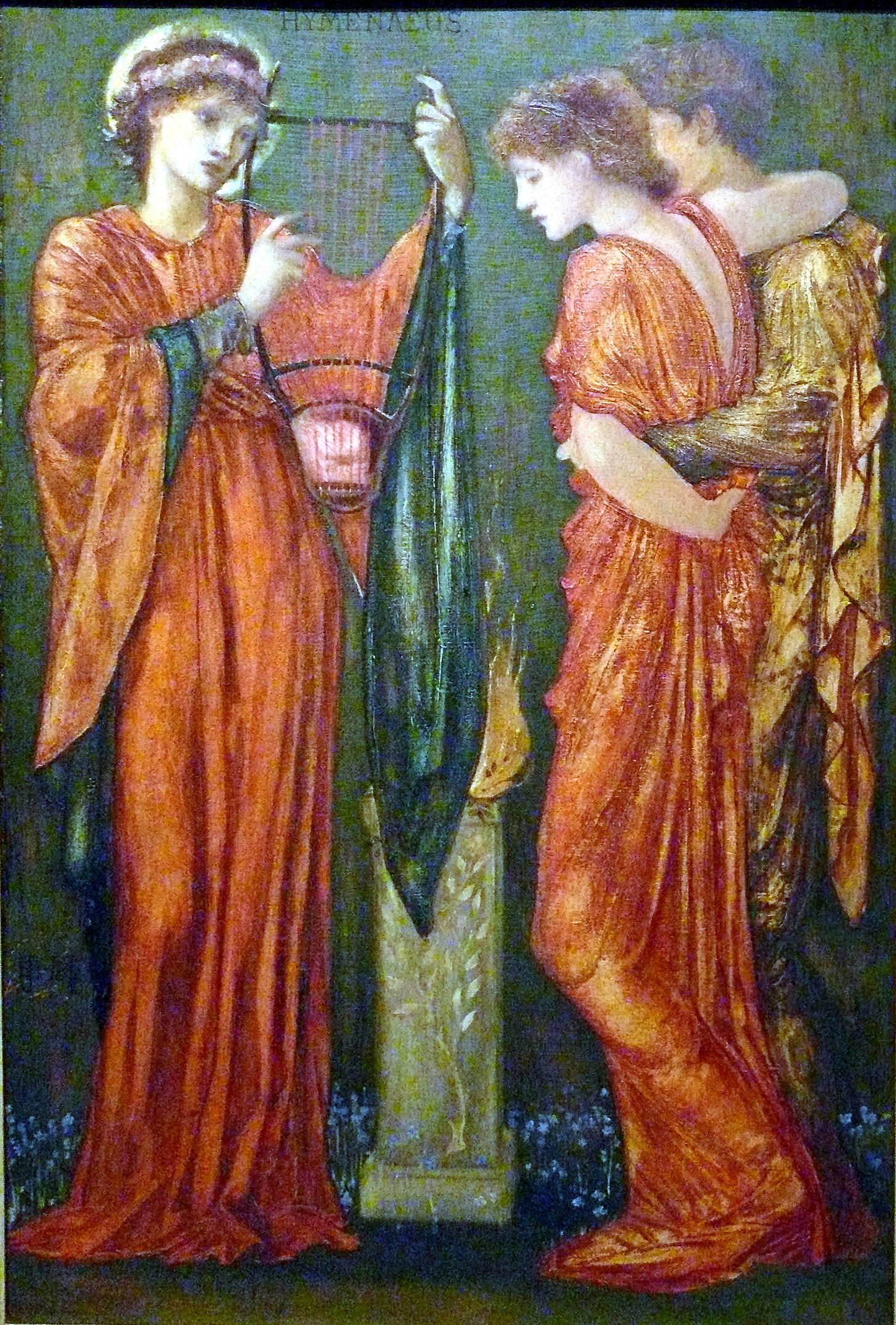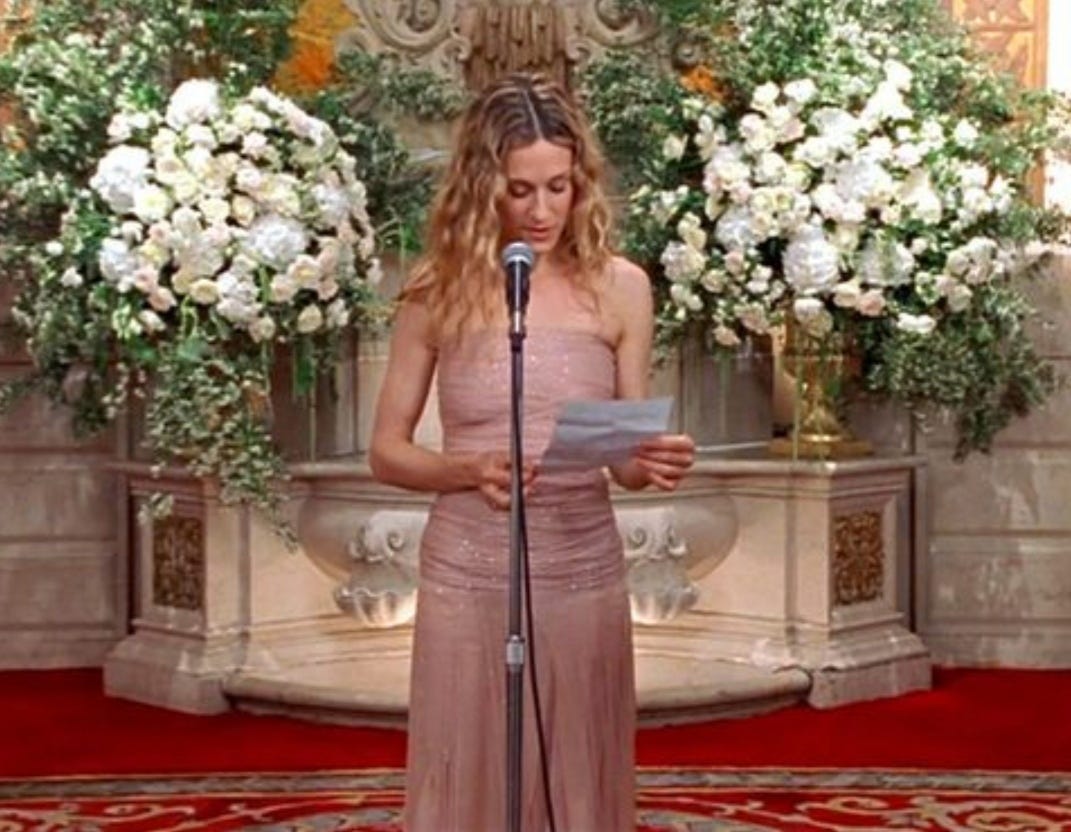Sex, The City, and the Classic Poetic Form That Just Might Come in Handy This Summer
Sick of And Just Like That...? Escape Back to the good old days (or were they?) of Sex and the City with Carrie’s wedding poem and learn about a poetic form to keep in your pocket for wedding season.
Only three days left to get 20% off your subscription to PopPoetry forever! Check out these posts to learn more about subscriber perks and what’s next. If you value the work that goes into PopPoetry each week, consider becoming a paid subscriber!
We’re a long way from wedding season, but somehow, in the winter of 2022, we’re smack dab in the middle of Sex and the City season, or rather, the Sex and the City reboot/spinoff/show-without-Kim Cattrall known as And Just Like That…
The reboot has drawn tons of criticism, much of it well-earned. And in a truly weird pop culture moment, Chris Noth (that’s Mr. Big, for the rest of us) and Peloton dominated the news cycle for weeks in a series of at first funny and then horrifying ups and downs that ended with Noth’s removal from the revival.
AJLT… feels like an attempt to create something that speaks to “today’s moment” written by the most out-of-touch people one could drag into a writer’s room. As much as I applaud the proliferation of roles for older women on television, the show fails to capture the magic of its predecessor. What’s more, instead of addressing some of the original show’s more problematic character and plot elements, the reboot simply tries to wallpaper of its shortcomings with a panoply of racially and sexually diverse supporting characters whose presence, through no fault of their own, doesn’t do much to reinvigorate, rectify, or mature the show.
A swing and a miss, you might say.
Today, let’s leave AJLT… alone and take a closer look at Season 2 Episode 7 of SATC: “The Chicken Dance.” A classic for a classic poetic form: perfection.
Carrie Bradshaw, Famous Poet
In this episode, Carrie (Sarah Jessica Parker), Samantha (Kim Cattrall), Miranda (Cynthia Nixon), and Charlotte (Kristin Davis) are invited to a wedding. The bride is Madeline Dunn (Carrie Preston), Miranda’s friend and interior decorator. Madeline met her groom when she barged in on Miranda’s date and experienced a flash of love at first sight with Jeremy (Stephen Barker Turner). Miranda is pissed because, you know, Jeremy was her date, but also because their engagement came after a week.
Madeline tells Carrie that she’s one of her favorite writers and that she loves her column. She assumes that because Carrie can write something she will be able to write everything. This is sort of true, but sort of isn’t. Asking a columnist to write a poem is less outlandish than asking a shortstop to write a poem, but writers who work in one genre don’t always work well, or at all, in another.
Nonetheless, Carrie takes on the task, if begrudgingly. She tells her friends about MAdeline’s request at lunch one day. Scenes like these, with their lightning-quick, profane banter, are the best part of the show.
CHARLOTTE: What does she want you to write?
CARRIE: A poem about love.
SAMANTHA: Dear god, I hope you said no.
As a sex columnist, Carrie is worried that she knows more about sex than she does about love. Her friends sympathize but are mostly caught in their own wedding-related dramas: Miranda is still peeved about the warp-speed wedding of her former paramour, Charlotte is obsessed with transcending the traditional bridesmaid-as-wallflower trope, and Samantha is moaning about how she might have to get married herself due to a recent sexual misadventure in which she realized she’d already slept with a man she was currently sleeping with.
SAMANTHA: So I’m officially out of men to fuck. I have to get married or move.
CARRIE: That’s lovely. Can I use that in my poem?
SAMANTHA: It’s yours.
Later, Carrie tells Big about the poem she’s been asked to write, which she says was a mistake. Big starts in with our favorite poetry trope: all poems must rhyme. “Love, glove, dove. Dove is good,” he muses in bed one night. “Love is like a dove. Or a big fuzzy glove.” Oy vey.
But worse than Big’s noxious rhymes is his inability to commit. It’s nauseating to watch him aver from intimacy throughout the episode. He won’t even sign the card for the gift he and Carrie are bringing to the wedding! Why, Carrie?! I’m glad he bit it on that bike.
Ahem. Anyway… Carrie pens the poem and shows up at the wedding four weeks later.
Here’s the text of the poem she wrote and reads:
His hello was the end of her endings.
Her laugh was their first step down the aisle.
His hand would be hers to hold forever.
His forever was as simple as her smile.
He said she was what was missing.
She said instantly she knew.
She was a question to be answered
And his answer was “I do.”
Carrie’s poem is better than it could have been. I particularly like the immediacy and repetition of the first line. The way the poem comes around to the phrase “I do” at the end is nice as well and is easily graspable to a large audience in this setting. I like the way that Carrie avoids rhyme (not taking Big’s suggestion) and instead creates patterns and resonance with the “He said… She said” and the idea of questions and answers. These are thematic rhymes, you might say, rather than linguistic ones. True, the poem does walk right into several clichés along the way, but hey—she’s not really a poet.
As the best poems so often do, Carrie’s own work catches her off guard and brings tears to her eyes in spite of her tough and cool exterior.
Overall, the poem is short, sweet, to the point, and meaningful. Madeline couldn’t have wanted more from a poem she solicited from a non-poet writer friend and seems genuinely touched.
For Carrie, the problem is not the poem: it’s that Big’s phone rang four lines in and he answered it. Carrie becomes keenly aware of the contrast between the words she’s written for Madeline and Jeremy and the relationship she finds herself in with Big. He simply does not seem interested in answering Carrie’s “question.” As the best poems so often do, Carrie’s own work catches her off guard and brings tears to her eyes in spite of her tough and cool exterior.
By the episode’s end, Big moves toward her 1% by agreeing to stay with her “until the end… of the wedding,” as Carrie cryptically says, but nothing really changes. Carrie goes home to eat cake in bed with him and begins to convince herself that their love is more like the clunky “fuzzy glove” phrase that Big offered in jest while she was drafting the poem than the polished, emotive poem that she completed and read.
The Epithalamion
There’s a name for the style of poem that Carrie wrote: the epithalamion. An epithalamion is typically a lyric poem written for the occasion of a wedding. The meaning and usage of the term “lyric” has a long history and can get tricky, but today we think of lyric as a poem that expresses a speaker’s personal feelings. Think of the word “lyre” and a young man sitting under a tree singing about his experiences while strumming his instrument.
Historically, the epithalamion was performed at the threshold of the couple’s new home and involved an address to Hymenaeus, the god of marriage ceremonies (a related form of ancient Greek poetry is the hymenaios, which was sung during a bride’s journey to the groom’s abode). Poetry likely predates written language and literacy, and the epithalamion was initially sung, and often by a chorus of voices.

Since the form’s inception in ancient Greece, many poets throughout history have written poems in this form, including Sappho, Pindar, and Theocritus. Edmund Spenser’s punishingly intricate and too-long-for-NYC-nuptials “Epithalamion,” first written in 1595, is regarded as one of the most important and successful versions of a classical epithalamion.
Today, an epithalamion is understood in looser terms as a poem of any kind written for a wedding. This literary tradition has deep roots, and modern wedding-goers can tap into this history of well-wishing and blessings for new couples themselves by reading or writing an epithalamion at the wedding ceremony or wedding reception.
Wedding Poems to Share
Have you been asked to read a poem at a wedding? Not up to writing your own like Carrie? Fear not! Here’s a selection of poems that might fit the bill. I’ve tried to avoid overused poems like Shakespeare’s sonnets and other many hundreds of years old pieces that can be confusing for novice hearers in the moment.
Some you might call an epithalamion, and others merely love poems with the kind of imagistic and succinct phrasing that works well when read aloud.
Jane Hirshfield, “A Blessing for a Wedding”
Seamus Heaney, “Scaffolding”
Maya Angelou, “Touched by an Angel”
Wallace Stevens, “Re-Statement of Romance”
Sophie Cabot Black, “Our House”
Rita Dove, “Heart to Heart”
Joy Harjo, “For Keeps”
What other love poems do you keep close to your heart? Have you read a poem at a wedding before or had one read at your own ceremony? Let me know in the comments!





